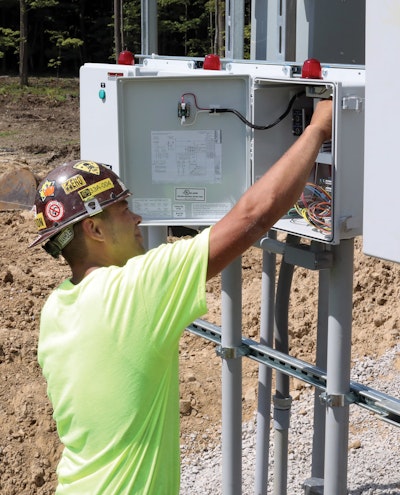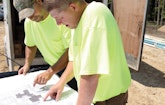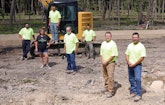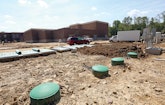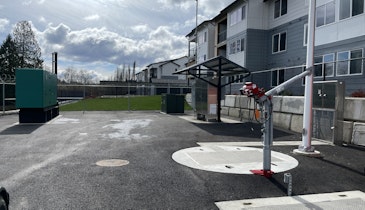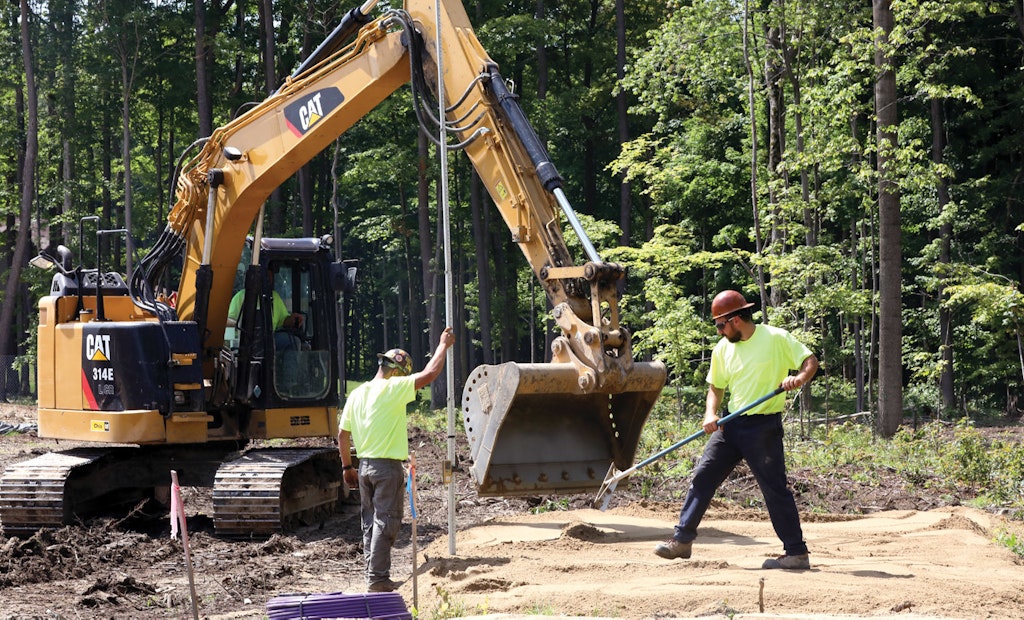
Bob Adams, left, and Bobby Derezic work on construction of a sand mound that is part of the two-year Parkside Elementary School project in Painesville, Ohio.
Marut and Sons Excavating was a seasoned, multigenerational family company that had always successfully adjusted to a changing marketplace when Onsite Installer chose it for one of the magazine’s first contractor profile subjects 15 years ago.
Back in 2004, Jeff and Scott Marut were only four years into their control of the business started by their grandfather, Bill, in 1945, with the legacy carried forward by their late father, Bob Marut.
Jeff, 47, is still president, Scott, 49, is still vice president, but the business has changed considerably. They’ve weathered the financial downturn, refocused what they do and now they’re aligned for a secure future driven by technological advances.
DIVERSE CLIENT LIST
Their road as young owners started with what they didn’t do. They resisted doing all the excavation work for just one, or maybe two, big homebuilders in their area.
“We’ve had opportunities to work for a guy who does 40 homes in a year, and we always shied away from that. I just never felt comfortable relying on one person,” Scott Marut says. “When things are going good, it makes life easy. But we never did that, and when that economy hit, a lot of guys were working for builders who stuck them for tons of money, and they folded up.”
Marut and Sons still took a financial hit. “Fall is really busy for us, and we cram in a lot of jobs before the bad weather comes. We were very busy in the fall of ’08, and we ended up not collecting close to $80,000. But we made it through,” Marut says.
What saved them was a dedication to learning new technology and to diversifying their business.
In 2004, drip systems and other new technologies were just starting to come into use in their area. Marut and Sons learned those technologies and built these systems steadily in their territory. Demand for this expertise led them into other counties surrounding metro Cleveland. The company also began servicing those systems. When construction work dried up, they had the service business to fall back on, and they expanded it.
Marut and Sons now manages the wastewater needs of about 800 homes. Much of that work is done under contract with homeowners’ associations that pay the company to do biannual inspections. From that also comes a large amount of related repair work.
Real estate inspections for property sales are another profitable and growing part of the company’s work. In the last three to four years, it has become the largest part of the business. It also includes repairs or replacements of troubled systems before a sale. Installations for new construction are only about a quarter of the business now.
INSPECTION AND REPAIR
Although homebuilding is healthy again in northeastern Ohio, the company has chosen not to jump back in, but to stick with what it’s doing, Marut says. “My cash flow is better, and my profit margins are better.” Construction now is more of a rat race, and the work is less consistent, he says. There is also less certainty about payment.
“Many times in new construction, we were the bank. You know, we’re owed $20,000, and the builder can pay us or make the interest payment on the four lots they have, and they’ll do that until the next bank draw two weeks later. Meanwhile, 30 days has turned into 45 days, and my suppliers want their money,” Marut says.
In real estate sales work, money moves in a different way. Often in their part of Ohio, a house will be unoccupied or for some reason the system can’t be inspected, Marut says. So the agent or bank will estimate a worst-case repair cost and hold 1.5 times that amount in escrow. If repairs are required, the money is in place.
Problems can still crop up when a buyer’s expectation of work is different from what the seller agreed to in the contract, Marut says. A common trouble was a buyer’s expectation that Marut would do site restoration, although the seller wasn’t paying for it. Marut prevents such disputes now by having both seller and buyer sign off on a contract so both understand the scope of work.
WORKING SMART
Because they are focused and specialized, the company can also work faster. The key to increased efficiency, according to Marut, is Mindy Powell, office manager.
“So much of our efficiency starts right in the office. My guys come in the morning, and she has a file for them with phone numbers and underground information. So they take this file, they get in the truck, and when they get there, they know material has been ordered and everything is ready,” Marut says.
The office is also key to dealing with real estate sales. Powell has systems in place to handle all the paperwork from real estate agents, banks, title companies and other players in a property transaction, he says. Having that office support made it easier for the company to refocus its business, Marut says. A one- or two-man operation would find it difficult or impossible to do the same work because of the paperwork demands, he says.
Before Ohio onsite rules changed in 2015, conventional systems were common. Now that’s not the case because work is tightly linked to extensive soil analysis.
“A lot of our stuff is elevated in the form of mounds or something along that line,” Marut says. “If the soil allows, then we still do conventional systems. If we don’t have enough property or have conditions where we can’t put a system on somebody’s property, the people have to apply for a surface discharge permit.” Permits from the Ohio Environmental Protection Agency typically require some kind of advanced treatment unit with UV disinfection as a final step.
An unintended consequence of the new state rules was an increase in demand for soil scientists, but the number of available scientists was quickly exceeded by the workload. At the moment, replacing a failing system can take weeks because Marut has to find someone to do soil work before he can propose a solution.
“Designing a system based on the soil is the right way to do it. It just slows the process down and makes it a challenge,” Marut says.
KEEPING CONNECTED
It’s a good thing for Marut and Sons that it has systems in place to handle the demands of its business because time is harder to come by 15 years after the first Onsite Installer story was published. In 2004, mobile phones were just becoming items that people carried regularly. Introduction of the iPhone, with its email and pocket internet access, was still years in the future.
“The paperwork and cellphones have really made the amount of time you can spend on a job a challenge,” Marut says.
Customers expect instant contact with cellphones, even when you’re in the field, he says. “So many people want to meet during the day now. They have flexible schedules, and they’d rather not meet you at night because they’re off at football games or whatever.”
Social media is one tool the company should use more often because it’s a good way to market at no cost, Marut says. Yet the company also has a lot of referrals.
The company has made itself known by raising money for local schools, and the crew built a couple of baseball fields for local high schools.
IN THE YARD
Focusing the business means simplifying the equipment needed. For its tasks, Marut and Sons runs:
- Three excavators: a 2017 Cat 314, 2014 Cat 305 and 2015 Cat 305
- 2019 Kubota skid-steer
- 2012 Bobcat skid-steer
- 2011 International single-axle dump truck
- 2005 Mack tandem-axle dump truck
- Ford F-800
- Several Ford box trucks for service vehicles.
FORWARD THINKING
After 74 years in business, Marut and Sons at some point will face the question of passing the company to the next generation, yet Jeff and Scott have no intention of forcing that to happen.
Scott’s son, Jake, 21, is studying mechanical engineering at the University of Mississippi and is interning this summer with a large engineering company retrofitting a large wastewater plant. Scott and wife Carrie’s other children are Jessica, 22, and Abbey, 18. Jeff and his wife Jennifer’s children are a bit younger. They are Brock, 18; Cole, 15; Vance, 12; and Milan, 7.
In 2004, it was Scott’s dad, Bob, who grounded him. When he or his brother had wild ideas, Bob would pull them back to earth. Bob died in 2017 but still grounds Scott — although it’s through the voice that many sons carry in their heads.
“We’ll be involved in something, and my brother and I will laugh and say, ‘Could you imagine if Dad saw us tackling this thing?’” Marut says.
“My dad was a simple guy. He worked for Jeff and me a few days a week, but when he was 55, he was semiretired. He was always active and busy, but he got away from the pressure part of the business,” Marut says.
Bob worked until about 2013, and he was a father figure to the other people in the company. Every day someone has a story about what he did, Marut says.
After 74 years, there’s a lot to appreciate at Marut and Sons. There’s a lot to reflect on, but because of hard work and a vision of the future, there is also a clear direction.
Help wanted
“In the construction industry in general, it’s very difficult now to find people in the trades. Plumbers, electricians — it’s tough out there to find those. The local builders struggle,” observes Scott Marut, vice president of Marut and Sons Excavating in Perry, Ohio.
A shortage of skilled workers slows the onsite trade, too. If he gets 10 calls from potential clients, Marut says he has to tell eight of them that he can’t commit to the job because he doesn’t have enough people.
“We get summer help, but it’s hard to find competent people out there,” Marut says.
The core employees of Marut and Sons are longtime workers. Technician Mike Heitmen has been with the company for 18 years and Bob Adams for 11 years. Mindy Powell, office manager, came 15 years ago. Bill Pike, service technician, was a great addition a decade ago, Marut says.
Marut would like to expand a bit, if only he could find the people.
